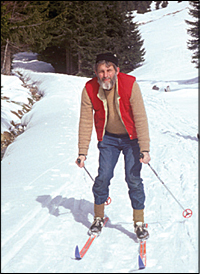
Am Fam Physician. 2008;78(10):1144
I got multiple sclerosis (MS) in 1987. I've had it for 21 years, which is not a world record, but a fairly long time. All the books say you have to tolerate the misery. My innovation is to tolerate the misery better—figure out how not to let it turn into anger. Think of all the things MS does. The disease nibbles at you. I remember when I played tennis. I used to go hiking. I used to play the banjo—I had a pretty good fingerpicking style. I can't walk anymore. I can't even stand up. MS takes away your ability to laugh.
Little bits and pieces were taken away and it infuriated me. There was a time when I was still swimming across the lake. I would lay my crutches aside as I walked into the water. I'd float out into the lake and look at the sky. One time, a blue heron came flying three to four inches above my nose and then swooshed down into the water. I don't know what he was trying to do—maybe get me out of there. I looked at the clouds. I saw the airplanes. I used to be able to tell what kind they were, because I had pretty good vision then. I was fascinated by the nature all around me. I didn't even want to get to the other side. You lose your anger by being diverted and by doing something that amazes you.—c.h.

COMMENTARY
I've had the privilege of caring for C.H. for the past six to seven years. C.H. was already in the late stages of MS when he came to me as a new patient. He is extremely bright and inquisitive, and he never complains. On his bad days, he is sedate and withdrawn. On his good days, he is vibrant and engaged. C.H. has an advantage many patients do not have—he has a caring family and a strong safety net. He has a wonderful, attentive caregiver who looks after his hygiene and medical needs. C.H. and his caregiver have formed a bond that often shows itself as subtle smiles and looks. In an ideal world, all patients with needs like C.H.'s would have such a caring environment. I believe that love and support have helped keep his disease burden to a minimum.